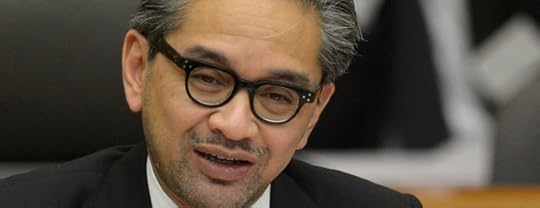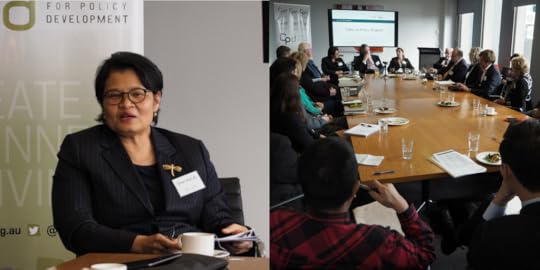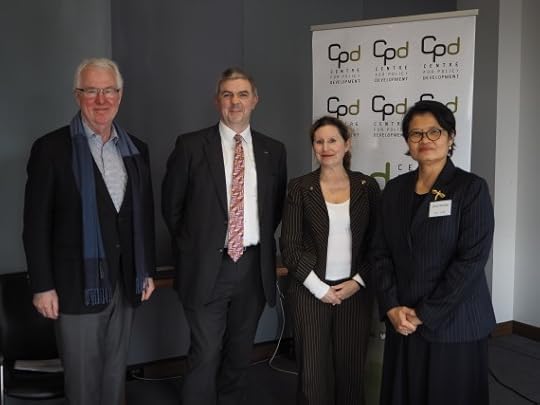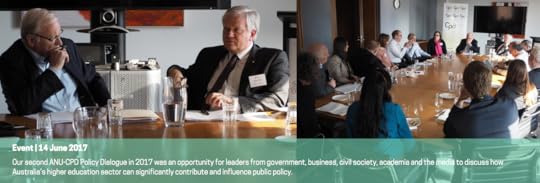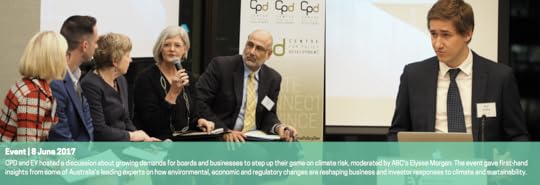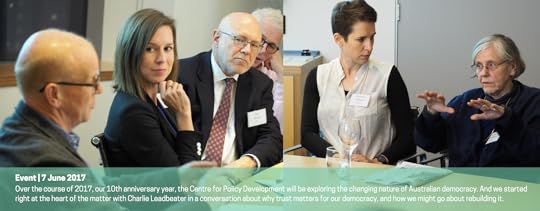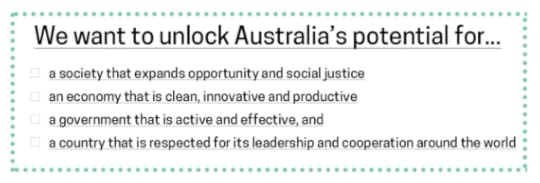Centre for Policy Development's Blog, page 33
September 8, 2017
RSVP: John Menadue Oration by Marty Natalegawa | 2 November 2017 | Melbourne
WHEN: Thursday, 2 November 2017, 5.30pm – 8.00 pm
WHERE: State Library Victoria, Village Roadshow Theatrette 179 La Trobe St, Melbourne
Join us to welcome Marty Natalegawa, Indonesia’s former Foreign Minister, who will deliver CPD’s inaugural annual oration as part of our 10th-anniversary series in November.
Pak Marty has been described as “one of the most respected foreign policy and international security thinkers of his generation, both within Indonesia, in South East Asia, and in the broader Asia-Pacific region“.
We’ve asked Pak Marty to speak on the theme for our 10-anniversary series: ‘Can Democracy Deliver?‘:
How can we strengthen our democracy so that it better serves us in solving the big problems of our time, including
climate change, forced migration, inequality, the future of work, and social cohesion?
What can be done to fix, or create, the systems, practices and cultures of democratic government that can transmit sound
ideas into implementation?
What is preventing Australian democracy from delivering difficult but necessary policy reform?
Given Pak Marty’s policy, political and leadership experiences in Indonesia, the broader Asia-Pacific region and at the global level, his perspectives on the challenges facing democracy in this particular international moment will be especially timely and valuable.
We would be delighted if you could participate in this special event. RSVP here.
There will be a cocktail reception after the oration.
For an introduction to some of the issues at the heart of CPD’s 10th-anniversary series on democratic renewal, listen to Charlie Leadbeater’s opening remarks at CPD’s forum on trust in democracy, held in June 2017:
http://cpd.org.au/wp-content/uploads/2017/06/Charlie-Leadbeater_Why-trust-matters.m4a
Dr Raden Mohammad Marty Muliana Natalegawa (Dr Natalegawa) served as the Foreign Minister of the Republic of Indonesia from 2009-2014. Prior to his appointment as Foreign Minister, he served as the Permanent Representative of the Republic of Indonesia to the United Nations in New York from 2007–2009.
Dr Natalegawa also served as the Ambassador of the Republic of Indonesia to the United Kingdom and Ireland from 2005-2007, and in the years 2002–2005, he consecutively served as the Chief of Staff of the Office of the Minister of Foreign Affairs and as the Director General for ASEAN Cooperation in the Department of Foreign Affairs.
His term as Director General for ASEAN Cooperation coincided with Indonesia’s chairmanship of ASEAN, a period marked by intensive effort to promote the idea of an ASEAN Community which was formally endorsed by the member countries through the 2003 Bali Concord II.
He served at the Permanent Mission of Indonesia to the UN between 1994 and 1999, including during Indonesia’s membership of the Security Council in 1996-1997.
In addition to his Doctor of Philosophy from The Australian National University, Dr Natalegawa completed a Master of Philosophy at Corpus Christi College, University of Cambridge, and a Bachelor of Science (Hons) at the London School of Economics and Political Science.
CPD’s inaugural annual oration has been named in honour of John Menadue AO, CPD’s founding Chairperson, in recognition of John’s contribution to public policy in Australia and to CPD. John served as Secretary of the Department of Prime Minister and Cabinet under Prime Ministers Gough Whitlam and Malcolm Fraser, was Australia’s Ambassador to Japan, and held senior roles in the business community. He remains a CPD fellow.

The post RSVP: John Menadue Oration by Marty Natalegawa | 2 November 2017 | Melbourne appeared first on CPD.
September 6, 2017
Cities as Policy Shapers | ANU-CPD POLICY DIALOGUE | August 2017
You can listen to the opening remarks of our speakers here:
http://cpd.org.au/main_wordpress/wp-content/uploads/static/CPD_Dialogue.mp3
Our rapidly urbanising world faces unprecedented social, environmental and economic challenges, all of which will be keenly felt in cities. They demand foresight and sustainable policy responses. Cities have long been tasked with developing sub-national responses to these problems. Increasingly, they are required to be ‘policy shapers’ or ‘first movers’ and project policy responses to national and to international audiences.
What are the key economic, social and sustainability risks and opportunities for cities?
How have cities become national and international ‘policy shapers’?
What policy development is required to create resilient, inclusive and sustainable cities?
These questions were at the heart of our third ANU-CPD Policy Dialogue for 2017, moderated by our Chair Terry Moran. The interactive discussion commenced with opening remarks by the CEOs of the City of Melbourne and the City of Sydney, Ben Rimmer and Monica Barone and the Consul-General for Indonesia, Dewi Wahab.
The high-level roundtable was an opportunity for leaders from government, business, civil society, academia and the media to discuss the modern role of cities in policy development and practice.
Participants:
Ben Rimmer (CEO, City of Melbourne), Albert Abdi (Consul Consulate-General of the Republic of Indonesia), Anand Kulkarni (Consultant and Principal Adviser, Victoria University), Banga Malewa (Vice-Consul, Consulate-General of the Republic of Indonesia), Craig Connelly (CEO, Ian Potter Foundation), Dewi Wahab (Consulate-General, The Republic of Indonesia), Gareth Evans (Chancellor, ANU), Josi Khatarina (Senior researcher, Indonesian Centre for Environmental Law), Gemma Henderson (BCG), Kate Vinot (Director City Strategy and Place, City of Melbourne), Kelly Grigsby (CEO, Wyndham City Council), Martin Stewart-Weeks, Matt Minchin (Executive Director City Deals, Department of Premier and Cabinet), Michel Masson (CEO, Infrastructure Victoria), Monica Barone (CEO, City of Sydney), Nina Taylor (Councillor, Glen Eira City Council (+ CPSU), Sarah Alexander (YLab Design Director Foundation for Young Australians), Terry Moran (Chair, CPD), Tom Bentley (Principal Adviser to the Vice Chancellor, RMIT / The Conversation), Travers McLeod (CEO, CPD), Victor Perton (Leadership Adviser & Advocate).
CPD would like to thank Gareth, Monica, Dewi, Ben and the team at ANU House for hosting the event, and participants who contributed to an engaging and expert start to the ANU-CPD Policy Dialogue Series.

The post Cities as Policy Shapers | ANU-CPD POLICY DIALOGUE | August 2017 appeared first on CPD.
July 23, 2017
Vale Bernie Shepherd, 30 May 1944 – 23 June 2017
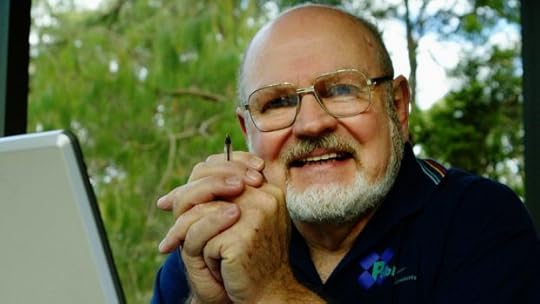
It is with great sadness that we say farewell to one of CPD’s dearest fellows, Mr Bernie Shepherd AM FACE.
Bernie Shepherd was a public educator, school leader, scientist, researcher and writer like few others. Rising from humble beginnings he became widely known in his recent years for his forensic analysis of the data behind My School and telling the story of what it revealed about our schools, and in a real sense, about our nation.
Bernie had a distinguished career as a teacher and principal. He predominately taught and developed curricula in science. He was also the founding principal of the first public senior high school in New South Wales, St Marys Senior High School. Bernie’s retirement from teaching was in name only, as he became a highly-respected expert in school funding models and education policy, as well as a mentor to other teachers and principals. He was a prolific author, on his own and with colleagues like Chris Bonnor. Bernie joined CPD as a Fellow in 2016, and during this time became one of the most active, influential and industrious fellows in CPD’s ten-year history. He co-authored two major reports for CPD, Uneven Playing Field: The state of Australia’s schools released in 2016, and Losing the Game: State of our schools in 2017 released on 21 June this year.
Bernie did school funding analyses that virtually no one else did, and his contributions are widely recognised as unique and highly influential to the national debate on education. He leaves a tremendous legacy in our education system.
It was an absolute pleasure, and a singular privilege, to work with Bernie in advancing such a worthy cause as improving the education system for all our school students.
His tireless devotion to this cause and his unparalleled industriousness and work ethic are virtues we have came to know well and greatly admire. He inspired our team to strive higher, work harder, and to never waver in our focus on securing a better future for this country.
We wish his family every sympathy, and remain forever great admirers of Bernie and his achievements.
Chris Bonnor’s wonderful tribute to Bernie in the Sydney Morning Herald is available here.
CPD also placed a dedication in the Sydney Morning Herald on 21 July which is available here.

The post Vale Bernie Shepherd, 30 May 1944 – 23 June 2017 appeared first on CPD.
June 20, 2017
Losing the Game: State of our schools in 2017 | REPORT | June 2017
Six years after the recommendations from the original Gonski Review into education were published, Australia is once again on the cusp of major education reform. In early May, the Turnbull Government surprised everyone by proposing a new package of needs-based, sector-blind schools funding for the next decade. David Gonski AC returns to chair another inquiry into achieving excellence in Australia’s classrooms. Since May, there has been extensive discussion about the merits of the reform proposal, and the Australian Education Amendment Bill 2017 is before the Federal Parliament.
Amidst this revitalised national debate, CPD released Losing the game: State of our schools in 2017 on Wednesday 21 June 2017. This new report is co-authored by Fellows Chris Bonnor and Bernie Shepherd, who between them have over 80 years of experience in the public school system. They co-authored the highly influential 2016 CPD report, Uneven Playing Field: The state of Australia’s schools.
Losing the Game is vital and sobering reading for anyone wanting to understand the state of our schools system, and will be required reading for the Second Gonski Review panel. Chris and Bernie examine the key trends in schools funding, performance and student composition, based on an analysis of My School website data for 2010 to 2016.
The report’s key findings include:
equity in Australia’s schools is declining since the original Gonski Review was released.
school intakes are becoming more polarised and socially segregated. Advantaged students move to advantaged schools and strugglers are left behind, literally in classes of their own.
schools are becoming less representative of local communities and less connected to them.
the ‘private school’ is vanishing with increased public money but with minimal public obligations.
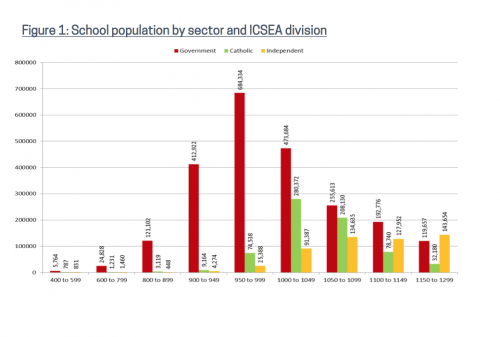 Figure 1 shows that government schools enrol the broadest cross-section of students, including the vast majority with higher levels of socio-educational disadvantage (see report p.19).
Figure 1 shows that government schools enrol the broadest cross-section of students, including the vast majority with higher levels of socio-educational disadvantage (see report p.19).
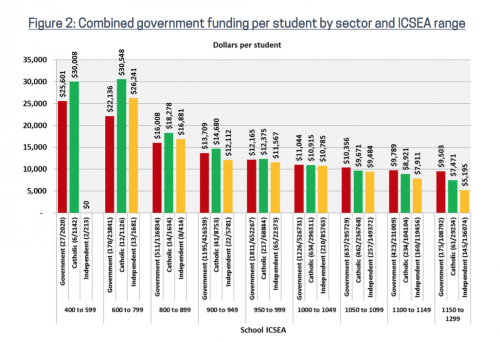 Figure 2 shows that combined government funding for Catholic and Independent schools (yellow and green bars respectively) tends to be similar to funding for government schools (red) that have a similar socio-educational profile (see report p. 28).
Figure 2 shows that combined government funding for Catholic and Independent schools (yellow and green bars respectively) tends to be similar to funding for government schools (red) that have a similar socio-educational profile (see report p. 28).
Losing the Game recommends that essential amendments to the package must be made to:
accelerate the proposed increases in funding to the most disadvantaged schools, and
create a National Schools Resourcing Body to ensure all sectors and levels of government are transparent and accountable.
Additionally, the Second Gonski Review should conduct an investigation into barriers in our current schools framework that risk preventing the implementation of its recommendations. A task force should also be established that monitors progress being made against the recommendations of the Second Gonski Review and the commitments of federal and state governments, and reports publically on them at regular intervals.
Key documents
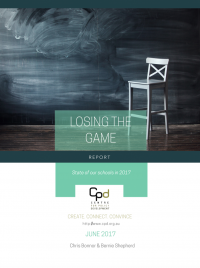
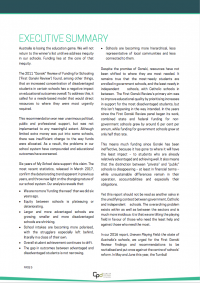
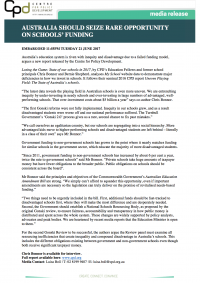
Full report
Executive summary
Media release
Media coverage and other reading
Chris Bonnor and Bernie Shepherd published a piece on their latest findings in The Guardian.
The Australian Financial Review’s Tim Dodd spoke with report co-author Chris Bonnor
Related reading:
Is Gonski 2.0 skilful trickery or chance to get schools funding right? Expert panel responds, The Guardian, Chris Bonnor
Uneven playing field: the state of Australia’s schools, CPD Report 2016, Chris Bonnor and Bernie Shepherd
The local school is in decline and stratification is to blame, Sydney Morning Herald, Ross Gittins
‘The inequity is worsening': a tale of two schools and a school funding debate, The Age, Henrietta Cook

The post Losing the Game: State of our schools in 2017 | REPORT | June 2017 appeared first on CPD.
June 15, 2017
The future of higher education – Gareth Evans in conversation with Brian Schmidt | ANU-CPD POLICY DIALOGUE | June 2017
Policymakers have incredibly difficult jobs. They have to design policies today for an uncertain future facing our economy, society and region. If we want to find answers to future challenges and craft suitable policies to tackle them, we need to achieve best practice performance in combining research, education and engagement. We need institutions in place that allow researchers, policymakers and the public to share ideas, work together and engage genuinely in developing long-term policies that benefit society.
On 14 June CPD and ANU invited leaders from government, business, civil society, academia and the media to discuss how Australia’s higher education sector can significantly contribute and influence public policy. The Dialogue featured ANU Chancellor and former Foreign Minister, the Hon Gareth Evans, in conversation with the Vice-Chancellor of ANU and 2011 Nobel Laureate, Professor Brian Schmidt.
Key points of the discussion
The key questions at heart of our Dialogue were:
What are the best practices in taking quality research to policymakers and working with them to produce policy change?
How can universities pair their nonpartisan approach with their research quality to advocate to governments on some of the harder and more complex challenges we face?
What is the role of universities in supporting better policy development today and helping to develop the policymakers of tomorrow
The interactive discussion commenced with some opening remarks by ANU Vice Chancellor Brian Schmidt. Brian emphasised the significant contribution universities can and should make to public policy, arguing that they were a critical provider of evidence-based data analysis, and ideas to policy makers. He stressed ANU’s unique position and its longstanding public policy connections in Canberra and beyond. However, he said ANU and universities generally still have a long way to go to realise their full potential in supporting better policy development.
His opening remarks were followed by a wide-ranging discussion with a diverse and expert audience, moderated by Gareth Evans. Participants included: Annabel Brown (CPD), Ben Jensen (CEO, Learning First), Elaine Miles (Creative Services Consultant, IBIS World), Gemma Henderson (Principal, BCG), John Wiseman (Deputy Director, Melbourne Sustainable Society Insitute), Kerry-Ann Hugo (Advancement Manager, ANU), Michael Rowland (ABC), Peter Binks (CEO, Business/Higher Education Roundtable), Phil Ruthven (Founder & Director, IBIS World), Sam Hurley (Policy Director, CPD), Sarah Wickham (Philanthropy Manager, Equity Trustees), Stuart Simson (Chair, Switch Group), Terry Moran (Chair, CPD), Victor Perton (Leadership Adviser & Advocate), Wesa Chau (Director, Cultural Intelligence).
Other key points of the discussion included:
The need for universities to have a greater understanding of how their students (and staff) are engaging in the public policy making process.
The potential of journalists to open the gates to public policy in a changing media landscape.
The idea of the value of conversations and the visible desire of people to contemplate policy issues and share their ideas in constructive conversations.
CPD would like to thank Gareth, Brian and the team at ANU House for hosting the event, and participants who contributed to an engaging and expert start to the ANU-CPD Policy Dialogue Series.

The post The future of higher education – Gareth Evans in conversation with Brian Schmidt | ANU-CPD POLICY DIALOGUE | June 2017 appeared first on CPD.
June 9, 2017
Directors’ Duties & Climate Risks Business Panel in Sydney | EVENT | June 2017
On June 8, CPD and EY convened an expert panel to discuss the role company directors need to play in response to climate-related risks to their business, and what this means for other sustainability and long-term challenges.une
The panel was moderated by the ABC’s The Business presenter Elysse Morgan and built on our earlier work on directors’ duties and climate risk. This includes the breakthrough legal opinion commissioned by CPD and the Future Business Council in 2016, which found that Australian company directors who fail to consider and disclose foreseeable climate-related risks may be liable for breaching their statutory duties. This opinion and its implications were specifically cited by APRA in its recent statement on the financial implications of climate-related risks, which set a new higher bar for leadership on and disclosure of the business impacts of climate change.
Our panel featured four prominent Australian leaders and experts in this field: Sam Mostyn (one of Australia’s leading independent directors), Pru Bennett (BlackRock’s regional head of investment stewardship), Maged Girgis (partner at MinterEllison) and Matthew Bell (Oceania Managing Partner Climate Change and Sustainability Services, Ernst & Young).
Key points of the discussion
The opinion’s profound impact was made plain during the panel’s discussion.
Maged Girgis, who was an instructing solicitor on the Hutley opinion, said that the potential links between directors duties and climate risk had been apparent for some time. He said the Hutley opinion had taken this conversation to a new level, grabbing the attention of senior business leaders, legal experts, regulators and the media. This had been reinforced by the brave leadership of APRA in what continued to be a difficult political and media environment for leadership on climate change.
Sam Mostyn agreed that the impact of the opinion had been substantial. Together with other developments like ARPA’s clear statement on the importance of climate risk, it had contributed to much greater awareness of the risks faced by corporate leaders and companies who don’t manage climate risk properly, and a greater focus on the skills and capabilities boards require to do better. She noted that its findings were relevant not only for climate change but on a whole range of other sustainability and long-term challenges that have clear implications for corporate performance in the near and long term.
Pru Bennett provided a perspective from one of the world’s largest and most influential institutional investors. In 2017 BlackRock elevated climate risk as one of its top priorities for engagement with company boards. She said there is still a significant gap between leaders and laggards on management of climate risk and sustainability performance – and that it was very easy for experts in the field to recognise the difference between quality sustainability strategy and superficial statements and reports written with public relations in mind. Disclosures and engagement had definitely improved but many large Australian companies still had a long way to go.
Matthew Bell highlighted recent EY research showing that a growing number of company directors were buying into BlackRock’s and other institutional investors’ focus on climate risk management and effective long-term governance. He said that signs of forward-looking leadership by business on these issues were very encouraging and that the commercial sector could play a crucial role in driving better long-term environmental outcomes even if policy and political leadership continues to lag.
CPD would like to thank Adam Carrel, Matthew Bell and the team at EY for hosting the event, and participants who contributed to an engaging and insightful discussion.
The post Directors’ Duties & Climate Risks Business Panel in Sydney | EVENT | June 2017 appeared first on Centre for Policy Development.
Directors’ Duties and Climate Risks Business Panel in Sydney | EVENT | June 2017
On June 8, CPD and EY convened an expert panel to discuss the role company directors need to play in response to climate-related risks to their business, and what this means for other sustainability and long-term challenges.une
The panel was moderated by the ABC’s The Business presenter Elysse Morgan and built on our earlier work on directors’ duties and climate risk. This includes the breakthrough legal opinion commissioned by CPD and the Future Business Council in 2016, which found that Australian company directors who fail to consider and disclose foreseeable climate-related risks may be liable for breaching their statutory duties. This opinion and its implications were specifically cited by APRA in its recent statement on the financial implications of climate-related risks, which set a new higher bar for leadership on and disclosure of the business impacts of climate change.
Our panel featured four prominent Australian leaders and experts in this field: Sam Mostyn (one of Australia’s leading independent directors), Pru Bennett (BlackRock’s regional head of investment stewardship), Maged Girgis (partner at MinterEllison) and Matthew Bell (Oceania Managing Partner Climate Change and Sustainability Services, Ernst & Young).
Key points of the discussion
The opinion’s profound impact was made plain during the panel’s discussion.
Maged Girgis, who was an instructing solicitor on the Hutley opinion, said that the potential links between directors duties and climate risk had been apparent for some time. He said the Hutley opinion had taken this conversation to a new level, grabbing the attention of senior business leaders, legal experts, regulators and the media. This had been reinforced by the brave leadership of APRA in what continued to be a difficult political and media environment for leadership on climate change.
Sam Mostyn agreed that the impact of the opinion had been substantial. Together with other developments like ARPA’s clear statement on the importance of climate risk, it had contributed to much greater awareness of the risks faced by corporate leaders and companies who don’t manage climate risk properly, and a greater focus on the skills and capabilities boards require to do better. She noted that its findings were relevant not only for climate change but on a whole range of other sustainability and long-term challenges that have clear implications for corporate performance in the near and long term.
Pru Bennett provided a perspective from one of the world’s largest and most influential institutional investors. In 2017 BlackRock elevated climate risk as one of its top priorities for engagement with company boards. She said there is still a significant gap between leaders and laggards on management of climate risk and sustainability performance – and that it was very easy for experts in the field to recognise the difference between quality sustainability strategy and superficial statements and reports written with public relations in mind. Disclosures and engagement had definitely improved but many large Australian companies still had a long way to go.
Matthew Bell highlighted recent EY research showing that a growing number of company directors were buying into BlackRock’s and other institutional investors’ focus on climate risk management and effective long-term governance. He said that signs of forward-looking leadership by business on these issues were very encouraging and that the commercial sector could play a crucial role in driving better long-term environmental outcomes even if policy and political leadership continues to lag.
CPD would like to thank Adam Carrel, Matthew Bell and the team at EY for hosting the event, and participants who contributed to an engaging and insightful discussion.

The post Directors’ Duties and Climate Risks Business Panel in Sydney | EVENT | June 2017 appeared first on CPD.
June 7, 2017
Why trust matters in our democracy – Conversation with Charlie Leadbeater | EVENT | June 2017
On Wednesday, 7 June 2017, CPD was excited to host our special guest Charlie Leadbeater for a roundtable on the topic of “Why trust matters for our democracy”. Charlie is one of the UK’s foremost researchers, writers and thinkers on creativity and innovation in the public, private and social sectors, and a former advisor to British PM Tony Blair.
The discussion, moderated by CPD’s Deputy Chair Jeni Whalan, started with some insightful opening remarks from Charlie on the nature and importance of trust, and on the alarming rate at which trust in our institutions seems to be diminishing, across government, business, media and community sectors alike. Our guests engaged in a wide-ranging conversation about the causes of diminishing trust (from political gridlock and economic inequality to a breakdown in connectedness in communities, societies and workplaces), the implications for government service delivery, policy development and politics, and whether technological innovations can help repair trust and rebuild engagement.
Participants included Alison Byrne (Executive Director Funding Disclosure and Compliance, NSWEC), Andrew Young (Consultant and advisor), Antoinette Le Marchant (CPD), Frances Flanagan (Research Director, United Voice), Frances Foster-Thorpe (Director, Nous Group), Julie Eisenberg (NSW Electoral Commission), Kate Miller (CPD), Leanne Smith (Visiting Fellow, ANU), Lindley Edwards (AFG Venture Group), Martin Stewart-Weeks (Public Purpose & CPD), Mike Stamp (BCG), Rhett Sampson, Roy Green (Dean, UTS Business School), Sam Hurley (CPD), Sarah Hurcombe (The Australian Centre for Social Innovation) and Tamson Pietsch (Senior Lecturer in Social & Political Sciences and Co-Director of the Australian Centre for Public History UTS).
CPD would like to thank Charlie, Roy Green and the team at the UTS Business School for hosting the event, and participants who contributed to an engaging and expert start to CPD’s 10th-anniversary series on the state of our democracy.

The post Why trust matters in our democracy – Conversation with Charlie Leadbeater | EVENT | June 2017 appeared first on CPD.
June 5, 2017
Help unlock Australia’s potential – “$50 for 2017” appeal
CPD fills a big gap in Australian policy-making
The political landscape of the past year could hardly have been more tumultuous at home and abroad. Throughout this uncertainty, CPD made a big difference to policy development in Australia and the region.
You may know our major successes. We advocated for fairness and equity for all children in our schools. We made the case for corporations and investors to take climate change seriously in commercial decisions. We facilitated the governments in our region to work together to better handle forced migration. With a small team, we did all this and much more.
We fill a big gap in the policy landscape in this country. Our work is valuable to the public because we pick up the policy challenges others put in the too-hard basket. We don’t ignore evidence, we build it. And we don’t get put off by partisanship, we get the right people in the room to break through it.
In 2017, CPD turns ten years old, and we want to ensure our second decade is even more influential than our first. On our tenth anniversary we’ll be discussing ways to reinvigorate Australian democracy and people’s confidence in government.
Please help us do more – we gratefully ask that you contribute $50 to CPD. All donations over $2 are tax deductible.
Your support allows us to make an even bigger impact throughout this next decade, for the benefit of all of us.
The post Help unlock Australia’s potential – “$50 for 2017” appeal appeared first on Centre for Policy Development.
Help unlock Australia’s potential – “$50 for 2017″ appeal
CPD fills a big gap in Australian policy-making
The political landscape of the past year could hardly have been more tumultuous at home and abroad. Throughout this uncertainty, CPD made a big difference to policy development in Australia and the region.
You may know our major successes. We advocated for fairness and equity for all children in our schools. We made the case for corporations and investors to take climate change seriously in commercial decisions. We facilitated the governments in our region to work together to better handle forced migration. With a small team, we did all this and much more.
We fill a big gap in the policy landscape in this country. Our work is valuable to the public because we pick up the policy challenges others put in the too-hard basket. We don’t ignore evidence, we build it. And we don’t get put off by partisanship, we get the right people in the room to break through it.
In 2017, CPD turns ten years old, and we want to ensure our second decade is even more influential than our first. On our tenth anniversary we’ll be discussing ways to reinvigorate Australian democracy and people’s confidence in government.
Please help us do more – we gratefully ask that you contribute $50 to CPD. All donations over $2 are tax deductible.
Your support allows us to make an even bigger impact throughout this next decade, for the benefit of all of us.

The post Help unlock Australia’s potential – “$50 for 2017″ appeal appeared first on CPD.
Centre for Policy Development's Blog
- Centre for Policy Development's profile
- 1 follower


